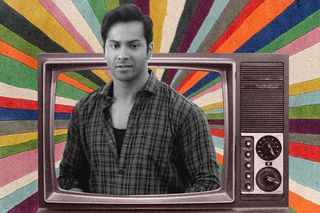
Can We Move On: From Men Who Invoke Marital Vows to Demand Their Wives’ Forgiveness
In Bollywood, once a man is married, it’s highly likely that he receives immunity against the consequences of any of his actions pertaining to his marriage. His marital vows are meant to be broken. His wife’s marit...

In Can We Move On, we revisit old tropes and question whether they have any remaining cultural relevance.
In Bollywood, once a man is married, it’s highly likely that he receives immunity against the consequences of any of his actions pertaining to his marriage. His marital vows are meant to be broken. His wife’s marital vows, though, to be by his side, come what may, become his suraksha kavach (armor of safety) — upon being invoked, they immediately absolve him of every wrongdoing towards his wife.
We know marriage is an inherently unfeminist institution. But what these movies depict — and even glorify — is how social conditioning leads women to treat their marital vows as the letter of the law, and follow them more earnestly than the laws of the land, too. In a way, then, marital duties often become a tool to subjugate women — and that’s precisely what this trope, perhaps unintentionally, communicates.
In Masti (2004), No Entry (2005), and Thank You (2011), entire plots revolve around men being unfaithful to their wives because, apparently, after committing to monogamous relationships with them, they woke up to realize they weren’t cut out for monogamy. However, upon changing their minds yet again and deciding to go back to monogamy, they’re soon forgiven by their wives. Moved by the men’s emotional outbursts and bound by their marital vows, the women agree to condone the cheating, the lies, and the disrespect meted out to them because, after all, pati parmeshwar hota hai (one’s husband is akin to one’s god).
The trope is archaic, but has continued to be a part of the cultural imagination of marriage. In 1986’s Naseeb Apna Apna, a song literally goes, “Bhala hai, bura hai, jaisa bhi hai — mera pati mera devata hai.” It suggests that irrespective of what a man does, it’s his wife’s duty to put him on a pedestal, and worship him. That’s precisely what happens in the movie too. Not only does Kishan (played by Rishi Kapoor) berate his wife, Chando (played by Raadhika Sarathkumar), for her looks, but he also goes on to wed another woman, Radha (played by Farah Naaz), while still being married to Chando. The law might not have forgiven him for polygamy, but Chando’s devotion to Kishan doesn’t cease. Eventually, Chando gets a makeover that makes her palatable to Kishan’s tastes. So, when his new wife dies, and he’s ready to resume his marriage with Chando, well, she’s happy to have him back.
A similar story plays out in 1995’s Coolie No. 1, too. A movie best left behind in the 90s, it was remade as late as 2020 — ushering in the same, old problematic message into the present decade. Despite being the target of an elaborate web of lies spun by her husband, Raju (played by Varun Dhawan), Sarah (played by Sara Ali Khan) forgives him at the drop of a hat upon being reminded that Raju has fulfilled the sole vow of loving her — in whatever twisted manner — and, therefore, she must fulfill all of hers.
The remake of the movie just two years ago speaks to the longevity of the same archaic narrative.
Related on The Swaddle:
‘Gehraiyaan’ Shows How Childhood Traumas Can Shape People’s Narratives With Sensitivity
In 2004’s Aitraaz, too, we witness Priya (played by Kareena Kapoor Khan) readily forgive the indiscretions of her husband, Raj (played by Akshay Kapoor), despite it being clear as day that he had hidden rather pertinent details of his past from her.
As an article from 2016 notes, “The [central] plot of the films focus more on bringing back the ‘estranged husband’ rather than highlighting the emotional turmoil faced by the female character on discovering her man’s adventure with his mistress” — betraying the sexism of the filmmakers.
Granted, people’s views on whether or not adultery is forgivable in a marriage vary wildly. But cheating isn’t the only thing men are readily forgiven for in Bollywood movies. In 1997’s Raja Ki Aayegi Baraat, Mala (played by Rani Mukerji) sues Raj (played by Shadaab Khan) for raping her. But upon being married to him, as per the orders of the court, she immediately begins worshipping him despite being treated awfully poorly by him, in return. At one point, in fact, she’s even willing to lay down her life to protect his — as her marital vows prescribe.
In both Hum Tumhare Hain Sanam (2002) and Chalte Chalte (2003), Gopal and Raj, both played by Shah Rukh Khan, are abusive towards their wives Radha and Priya, played by Madhuri Dixit and Mukerji, respectively. The abuse primarily results from Gopal’s and Raj’s insecurities, which manifest in the form of suspicion and anger towards Radha and Priya. Despite being traumatized by their husbands, though, both women are unrealistically quick to forgive them as soon as they apologize. In fact, in Chalte Chalte, Raj barely even apologizes to Priya. All he does, instead, is present with a very public and very grand — but largely hollow — declaration of love at an airport, reminding her of the promises they made to each other, and the dreams they shared.
It is interesting that in Bollywood — which has played its part in reinforcing the idea that women are cold, calculative creatures who marry for wealth — marital vows often trump women’s supposed shrewdness, in that regard. In Motichoor Chaknachoor (2019), Pushpinder (played by Nawazuddin Siddiqui) not only misrepresents his career prospects to his wife, Anita (played by Athiya Shetty), but is also physically violent with her. Anita, however — who had so far been depicted as a woman who would move mountains if they stood in the way of her goal to settle abroad — doesn’t just forgive him, but decides to stay back in their hometown so he could be happy.
Related on The Swaddle:
How Some People in Abusive Relationships Found Comfort, Freedom Through Infidelity
In a way, then, the trope also denies women agency. Unlike a show like The White Lotus, where we see Daphne (played by Meghann Fahy) hint that she’s aware of her husband’s infidelity and has her own coping mechanisms, in Bollywood, we see forgive-and-forget as the default option women resort to.
What movies like Coolie No. 1 paint as a triumph of love, though, actually perpetuates the pernicious conditioning of women into being all-forgiving when it comes to their husbands’ omissions and commissions, no matter how dire. According to this trope, a man’s marital vows aren’t nearly as enforceable as a woman’s. The message it puts forth, then, is that unbound by their promises and commitments, men will be men — when they’re not being petulant children, that is. And women, as their wives, must coddle and forgive every wrong of theirs, just as a mother would. The fact that marital vows — as a result of being woven in with religion due to personal laws — are already considered sacrosanct while divorce continues to be shrouded in stigma, facilitates the messaging and maintains the status quo.
It’s hardly surprising, then, that in real life, women often feel guilty for leaving even abusive husbands. It is true that financial and cultural constraints — besides emotional ties — can make it challenging for survivors of abuse, irrespective of gender, to leave their partners. Instead of exploring the emotional turmoil that might culminate in a couple reuniting despite the existence of intimate partner violence in a relationship, Bollywood pushes the narrative of how the ideal woman — like Pooja (played by Karishma Kapoor) from Biwi No. 1 — always forgives and forgets.
It’s 2022, and despite gender parity still being a distant dream, women across the world are not only assuming greater agency than before, but also carving an identity for themselves that isn’t hinged on that of their husbands. In this era, retiring the trope wouldn’t just curb its oppressive messaging, but also allow movies to keep up with the times. Moving on from the characters of Gopal and Raj, in 2006’s Kabhi Alvida Naa Kehna, Shah Rukh Khan played the role of Dev, whose wife, Riya (played by Priety Zinta), refuses to be a pushover, and divorces him. Instead of regressing through movies like Coolie No. 1, it’s important that we keep the momentum of women not being devotees of their husbands, going. Seriously, can we, please, move on?
Devrupa Rakshit is an Associate Editor at The Swaddle. She is a lawyer by education, a poet by accident, a painter by shaukh, and autistic by birth. You can find her on Instagram @devruparakshit.
Related


Pregnancy Speculations by Tabloids Aren’t Just Insensitive, They’re Also Sexist
